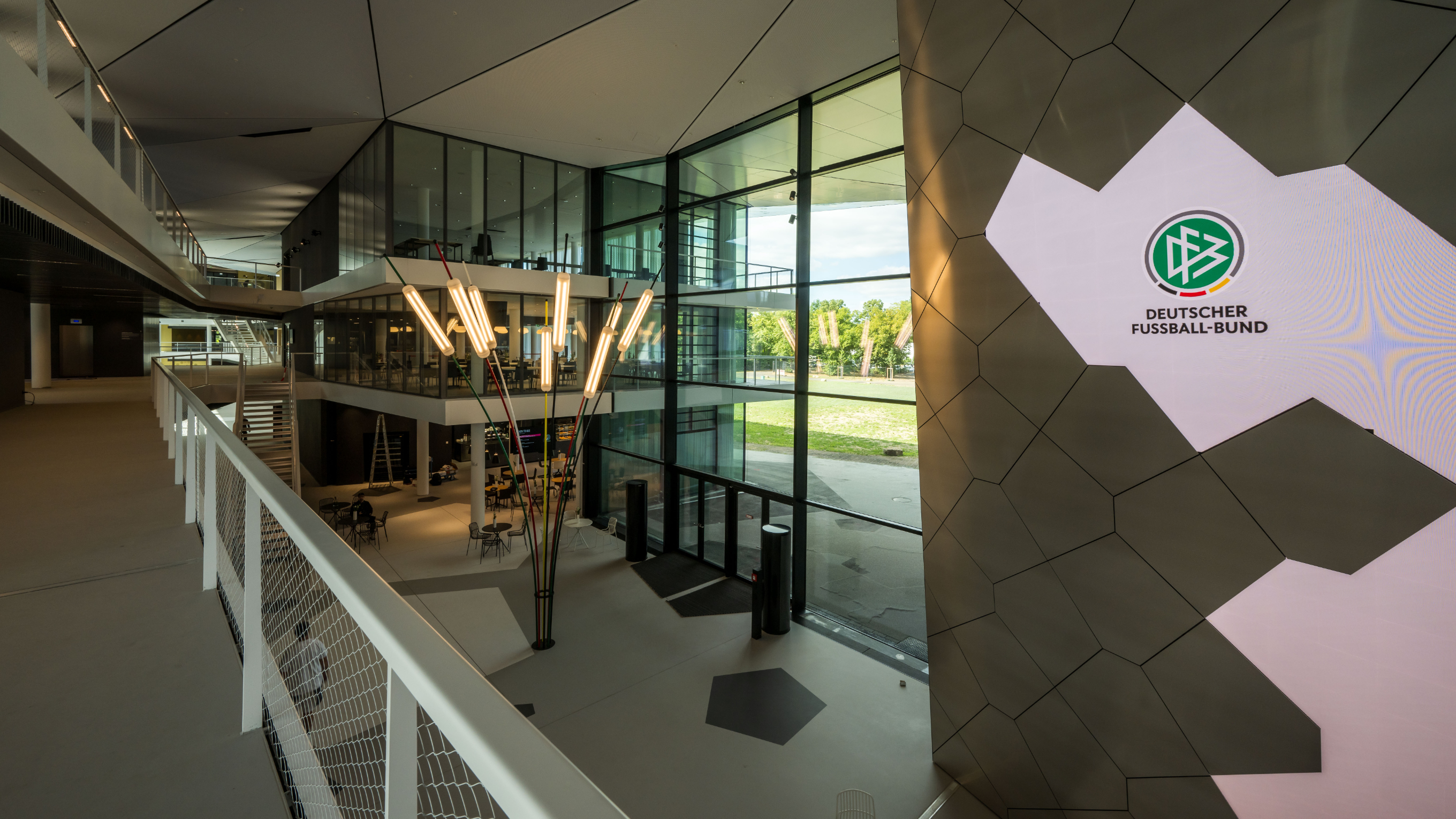
Deutscher Fußball-Bund
About Us
The structure of the DFB
The DFB, the sports organisation with the most members in Germany, is a social institution and one of the nation’s largest social networks. The DFB is effectively made up of 27 member organisations, and the structure resembles a pyramid, with DFB e.V., based at the DFB-Campus in Frankfurt am Main, at the top of it. The fully-owned subsidiary DFB GmbH & Co. KG belongs to DFB e.V. The members of the DFB are the DFL and the five regional associations, Nord, West, Süd, Südwest and Nordost. The regional associations are made up of 21 different state associations, which are then split up into local districts. A total of around 7.7 million members and 24,000 clubs are part of these different associations.

They are all represented in the central committees of organised football, DFB’s Presidential Board, Executive Board and the DFB Bundestag. The highest body, and effectively the ‘German football parliament’ is the DFB Bundestag. It represents the legislative branch of the DFB, where, every four years, the Presidential and Executive Boards are elected, and the statutes and regulations of the DFB are decided.
The Presidential Board, as the executive body, represents the executive branch of the association and is, according to the statutes, "responsible for handling the day-to-day business." The Executive Board reviews the reports of the committees and auditors and advises the members of the Presidential Board in the fulfilment of their duties. It consists of the members of the Presidential Board, the Presidents of the state and regional associations, as well as 12 representatives of DFL e.V.
Operational work is carried out in DFB specialist committees and commissions, which in turn include experts from all member associations. These activities are complemented by the foundations of the DFB and DFL e.V. The cohesion of everyone involved was confirmed by the Basic Agreement, which regulates the special rights and obligations of DFL e.V. as a member of the DFB.
Presidential Board
Members
DFB Campus
DFB-Companies

DFB GmbH und Co. KG
In January 2022, DFB GmbH & Co. KG emerged from a transformation of DFB GmbH and the outsourcing of the economic activities from DFB e.V. As a 100% subsidiary of the DFB, the new company consolidates its economic activities and digital business fields. DFB GmbH & Co. KG comprises five business areas: National Teams & Academy, Competitions, Marketing, Sales & Events, IT & Digital Affairs and Finance & Controlling.

DFB Schiri GmbH (Referees)
DFB Schiri GmbH is a subsidiary of DFB GmbH & Co. KG and DFL Deutsche Fußball Liga GmbH, in which the DFB holds a 51% stake and the DFL holds 49%. DFB Schiri GmbH officially began operations on 1st January 2022. It is divided into two business areas: "Sport and Communication" and "Management and Organisation".

DFB-Reisebüro (Travel Agency)
The collaboration between the DFB and Euro Lloyd began as early as 1965, before the two companies established a joint venture in 1993, with the DFB holding a 49% stake. Such a close and long-standing partnership is rare in the travel industry. The company, which has been called DFB-Reisebüro since 1st April 2013, organises all travel for the DFB, whether it’s a short or long-distance trip, or even one around the entire world.

Deutsches Fußballmuseum gGmbH (Football Museum)
The city of Dortmund and the DFB are equal shareholders of the DFB-Stiftung Deutsches Fußballmuseum gGmbH, which operates as the management company of the German Football Museum.




























